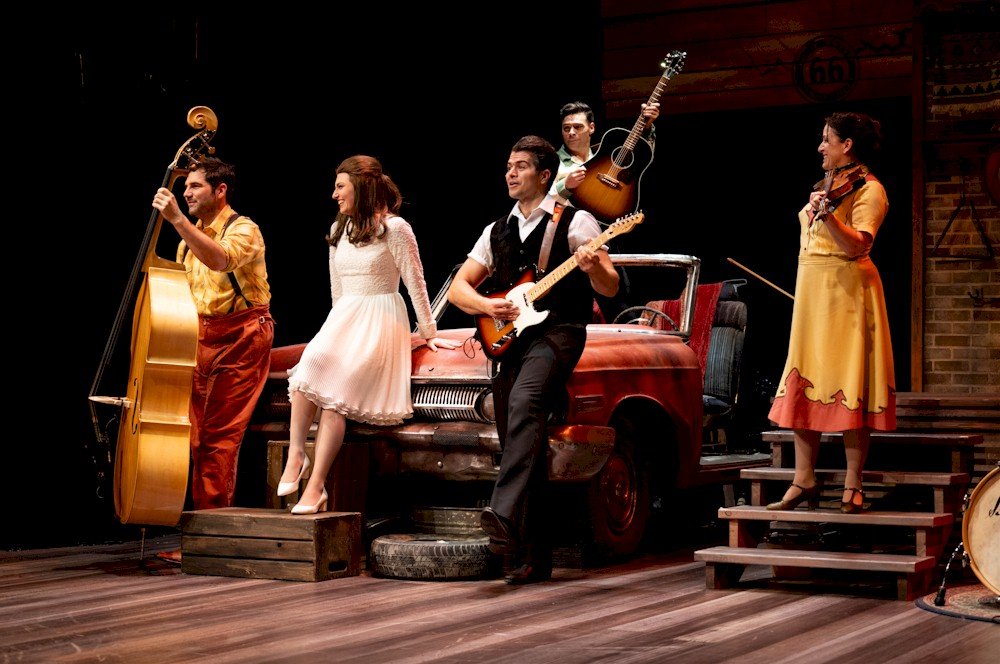Theatre review: Ring of Fire takes a creatively staged journey through the iconic songs of Johnny Cash
At the Arts Club’s Granville Island stage, instrument-playing cast members alternate the role of the Man in Black in an almost completely sung-through musical
The cast of the Arts Club Theatre’s Ring of Fire. Photo by Moonrider Productions
Arts Club Theatre Company presents Ring of Fire at the Granville Island Stage, extended to August 25
“I ALWAYS THOUGHT life was like a train ride. It may take you to places you’ve seen all your life. Or it might take you to places you never dreamed you’d visit,” says the tall man dressed in black, a guitar strapped to his back,
Spoken by actor Frankie Cottrell, these opening lines from Ring of Fire are a perfect setup for what audiences can expect from the show—a metaphoric journey through American music icon Johnny Cash’s work, incorporating events from his life. Almost completely sung through, the Arts Club’s new two-act musical is a celebration of Cash’s music, with heartfelt storytelling that remains true to the messages of his songs.
Under the helm of director Rachel Peake, with choreography by Nicol Spinola and music direction by Steven Charles, the show is a unique version of the original Broadway production that premiered in 2006. From the musical arrangements to the concept and staging of each number, the team here has crafted a creative production that showcases the considerable talents of the performers.
Cottrell is joined onstage by Devon Busswood, Daniel Deorksen, Tainui Kuru, Patrick Metzger, and Caitriona Murphy, all of whom play instruments in addition to singing and portraying various characters. It’s an impressive feat, with the cast skillfully accompanying themselves on instruments such as the guitar, piano, violin, cello, mandolin, and, in the spirit of folk and bluegrass music, the washboard. Thanks to Spinola’s staging, the playing of instruments is woven in seamlessly.
The overarching story here is Cash’s life, from his humble beginnings working on a cotton farm with his family to his rise through the music industry. Through this journey, we see him deal with substance abuse and navigate personal relationships, particularly with his second wife, June Carter. Cottrell, Deorksen, and Kuru continuously take turns portraying Cash, and Busswood primarily plays June. The sharing of the role of Cash not only helps make it manageable on the vocal cords, but also allows for different elements of Cash’s persona and vocal stylings to shine through. Kuru’s heartbreaking interpretation of Cash’s struggle with substance abuse spotlights some of the darkness in the Man in Black’s life; Deorksen’s charm and energy balance that with a sense of lightness; and Cottrell’s impressive lower range emulates the iconic sound of Cash's deep bass voice—essential to doing Cash’s music justice.
Each song is a vignette of either Cash’s life or a story told through the song that fits the world he lived in. “Five Feet High and Rising” sees the cast continually climb to higher ground on Patrick Rizzotti’s multifunctional set as a flood surges (drawn from a harrowing 1937 incident that actually happened to Cash’s family, after they were forced to flee their home when he was four years old).
The iconic “Folsom Prison Blues” becomes a vividly staged homage to the hardships of prison life. From his own brushes with the law, Cash had developed empathy for those in the prison system, many of whom were marginalized members of society. While the cast performs the tune with energy and style, there’s an intentional gravity and uneasy edge to the number here—the rhythmic slamming of a metal chain suggesting a chain gang.
One of the most touching moments of the show is Kuru’s performance of “Sunday Mornin’ Comin’ Down”, a powerful telling of the effects of substance abuse. Equally affecting is the unwavering compassion Busswood shows as she helps lift Kuru’s character back up. Busswood is exceptional throughout the show, moving with impressive versatility between a heartfelt performance of “I Still Miss Someone” at the piano and a supercharged rendition of “I’ve Been Everywhere”, performed in the audience and onstage, with nary a misstep in the tongue-twisting lyrics.
And while this isn’t a dance show, there’s a fun bit of soft shoe by Murphy and Cottrell, as well as energized movement from the entire cast throughout—even while playing instruments—thanks to Spinola’s guidance.
Rizzotti’s tiered set, which leaves plenty of space for large instruments like the piano and Metzger’s standup bass, as well as a gorgeous vintage car, makes the Granville Island Stage look huge. Steps leading up to platforms provide effective spots to sit and deliver a thoughtful moment, and the raised platforms sometimes serve as a stage upon a stage, giving the feel of a concert. Robert Sondergaard’s lighting acts as a collaborative storyteller, with designs and effects that fit the mood of each number, from the dark times of the substance abuse to celebratory moments, where sparkling lights shine from the top of the set.
At the heart of this show is Cash’s music, and Charles has done an outstanding job arranging the songs for the variety of voices and instruments. The singing from all six cast members is dynamite, and we’re treated to outstanding renditions of songs like “Get Rhythm”, “Jackson”, “A Boy Named Sue,” and of course, the title song, “Ring of Fire”. The performances honour the wit, compassion, and hard-scrabble wisdom that Cash weaved into his music. This train trip through Cash’s music and life is as contemplative as it is a joyride. ![]()













